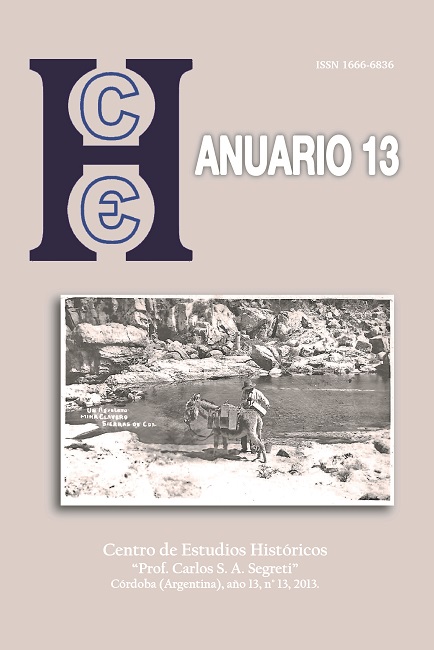The Secret Report to the 20th Congress of the Communist Party of the Soviet Union in the official perspective of the Argentine Communist Party. Reception and first repercussions
DOI:
https://doi.org/10.52885/2683-9164.v0.n13.22170Keywords:
Communist Party of Argentina, Communist Party of the Soviet Union, secret speech, stalinismAbstract
The aim of this article is to inquire about the first interpretations of the Communist Party of Argentina (PCA) on the subject of the Khrushchev’s report on February 25, 1956. Stalin’s death was marked as an opportunity from which the Communist Party of the Soviet Union (PCUS) should break with the logic inherent in the cult of personality and could recover the “purity” of Marxism-Leninism. The criticism to the “excesses” of mature Stalinism and the reforms in the early part of the process of “de-Stalinization”, generated a number of debates and reflection within the international communist movement. The central issues addressed in the XX Congress of the PCUS could not be obviated by the PCA, and the treatment given to them by the latter are the subject of analysis of this study.
Downloads
References
BIALER Seweryn, Los primeros sucesores de Stalin, México, FCE, 1987.
BITTER Stephen V., The Many Lives of Khrushchev’s Thaw: Experience and Memory in Moscow’s Arbat, Ithaca and London, Cornell University Press, 2008.
BRACKE Maud, Which Socialism? Whose Détente?: West European Communism and the Czechoslovak Crisis of 1968, Budapest and New York, Central European University Press, 2007.
CAMARERO Hernán, “Antiguas controversias, nuevos enfoques: clase obrera, sindicalismo y comunismo en la Argentina durante la primera mitad del siglo XX. Un estado de la cuestión”, PolHis, núm. 11, 2013.
CARRERE D’ENCAUSSE Hélène, El poder confiscado. Gobernantes y gobernados en la URSS, Buenos Aires, Emecé, 1983.
CASOLA Natalia, Estrategia, militancia y represión. El Partido Comunista de Argentina bajo última dictadura militar, 1976-1983, Tesis de Doctorado, Universidad de Buenos Aires, 2012.
CERNADAS Jorge, PITTALUGA Roberto y TARCUS Horacio, “La historiografía sobre el Partido Comunista de la Argentina. Un estado de la cuestión”, El Rodaballo. Revista de Política y Cultura, año VI, núm. 8, otoño/invierno 1998.
FEHER Ferenc, HELLER Agnes y MARKUS György, Dictaduras y cuestiones sociales, México, FCE, 1986.
GILBERT Isidoro, El oro de Moscú. Historia secreta de la diplomacia, el comercio y la inteligencia soviética en la Argentina, Buenos Aires, Sudamericana, 1994.
GOTOVITCH José, DELWIT Pascal y DE WAELE Jean-Michel, L’Europe des Communistes, Bruxelles, Éditions Complexe, 1992.
HÖBEL Cf. Alexander, “El PCI en el movimiento comunista, el ‘68 checoslovaco y la relación con el PCUS”, PALA Giaime y NENCIONI Tommaso (eds.), El inicio del fin del mito soviético. Los comunistas occidentales ante la Primavera de Praga, Barcelona, El Viejo Topo, 2008.
KOHAN Néstor, “Un brillante intelectual comunista. A 20 años de la muerte de Héctor P. Agosti”, Le Monde Diplomatique, Edición Cono Sur, núm. 61, julio de 2004.
MASSHOLDER Alexi, El Partido Comunista argentino y sus intelectuales: originalidad y marginalidad del pensamiento y acción de Héctor Agosti, Buenos Aires, Luxemburg, 2013.
PETRA Adriana, “El momento peninsular. La cultura italiana de posguerra y los intelectuales comunistas argentinos”, Revista Izquierdas, año 3, núm. 8, 2010, “Cosmopolitismo y nación. Los intelectuales comunistas argentinos en tiempos de la Guerra Fría (1947-1956)”, Contemporánea. Historia y problemas del siglo XX, núm. 1, 2010.
SERVICE Robert, Camaradas. Breve historia del comunismo, Barcelona, Ediciones B, 2009.
ZUBOK Vladislav M., Un imperio fallido. La Unión Soviética durante la Guerra Fría, Barcelona, Crítica, 2008.
Downloads
Published
How to Cite
Issue
Section
License
Aquellos autores/as que tengan publicaciones con esta revista, aceptan los términos siguientes:
- Los autores/as conservarán sus derechos de autor y garantizarán a la revista el derecho de primera publicación de su obra, el cuál estará simultáneamente sujeto a una Licencia de reconocimiento de Creative Commons. Se puede compartir, copiar, distribuir, ejecutar y comunicar públicamente la obra, siempre que: a) se cite la autoría y la fuente original de su publicación (revista, editorial y URL de la obra); b) no se use para fines comerciales; c) no se altere, transforme o genere una obra derivada a partir de esta obra.
- Los autores/as podrán adoptar otros acuerdos de licencia no exclusiva de distribución de la versión de la obra publicada (p. ej.: depositarla en un archivo telemático institucional o publicarla en un volumen monográfico) siempre que se indique la publicación inicial en esta revista.
- Se permite y recomienda a los autores/as difundir su obra a través de Internet (p. ej.: en archivos telemáticos institucionales o en su página web) después del proceso de publicación, lo cual puede producir intercambios interesantes y aumentar las citas de la obra publicada. (Véase El efecto del acceso abierto).


